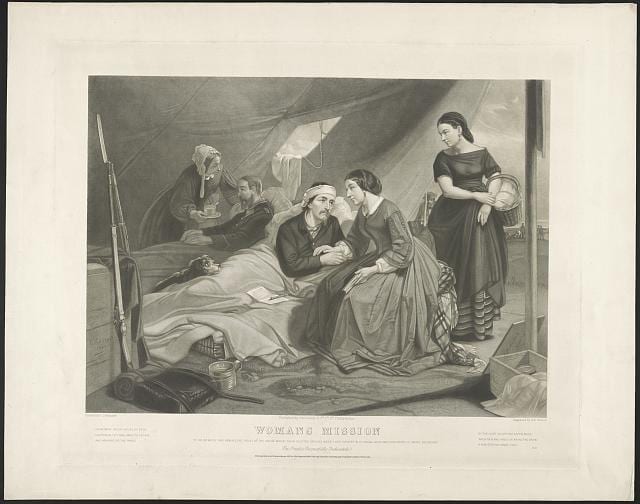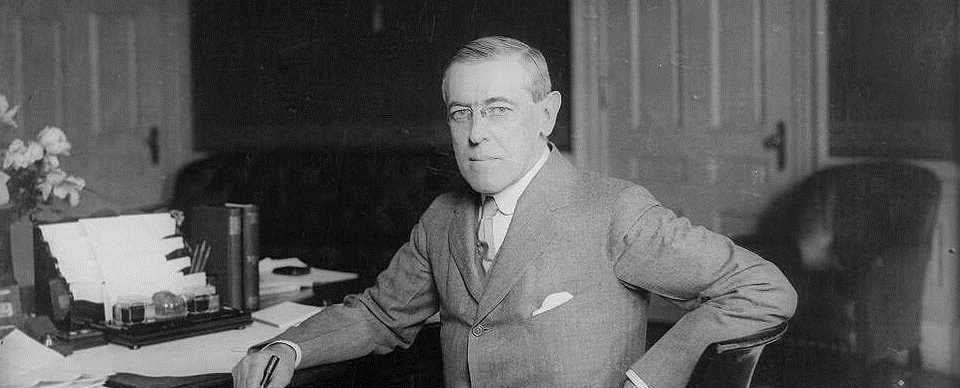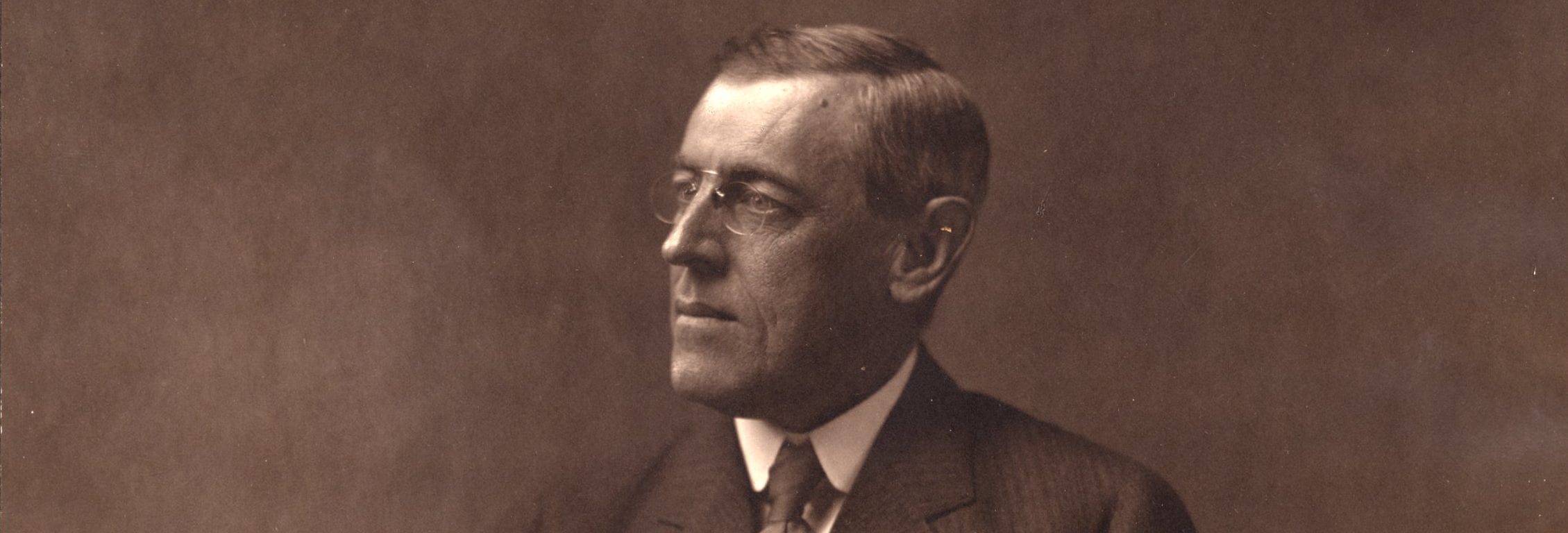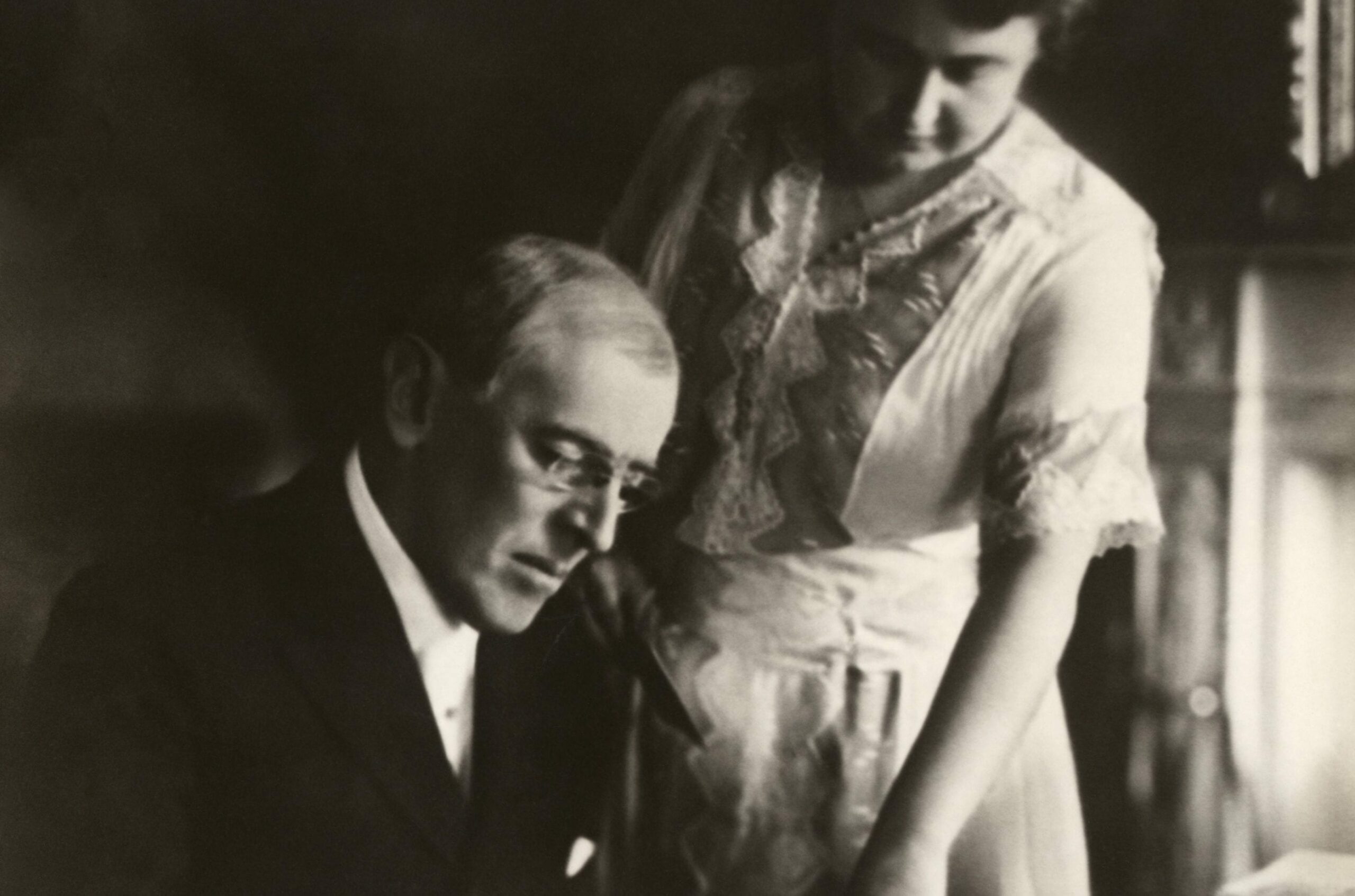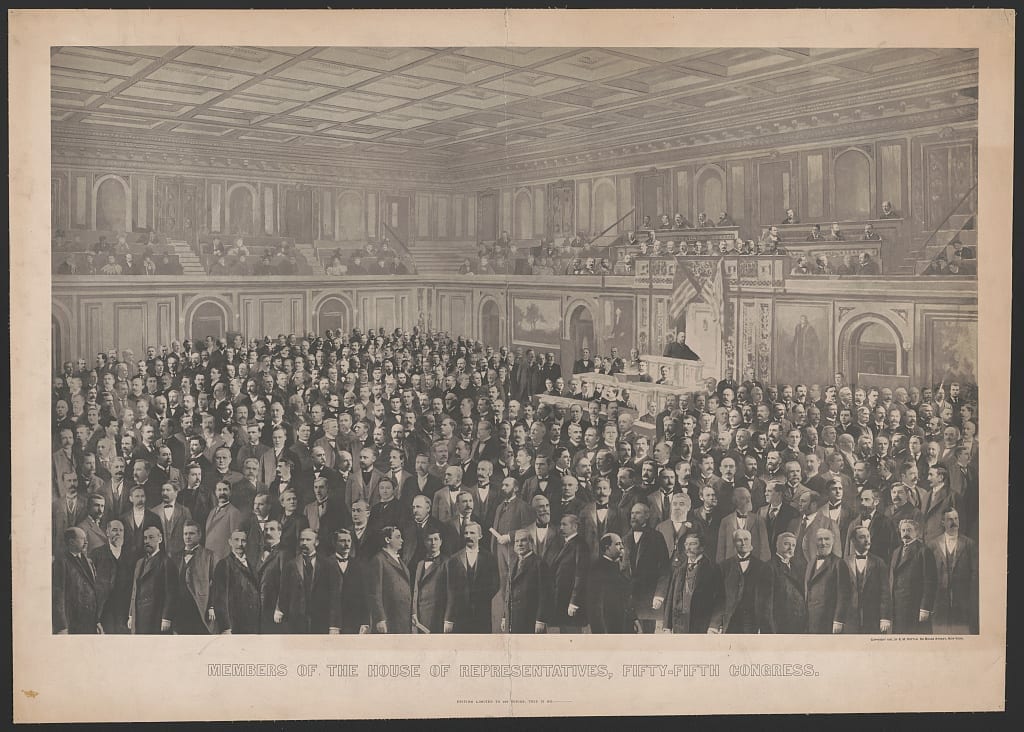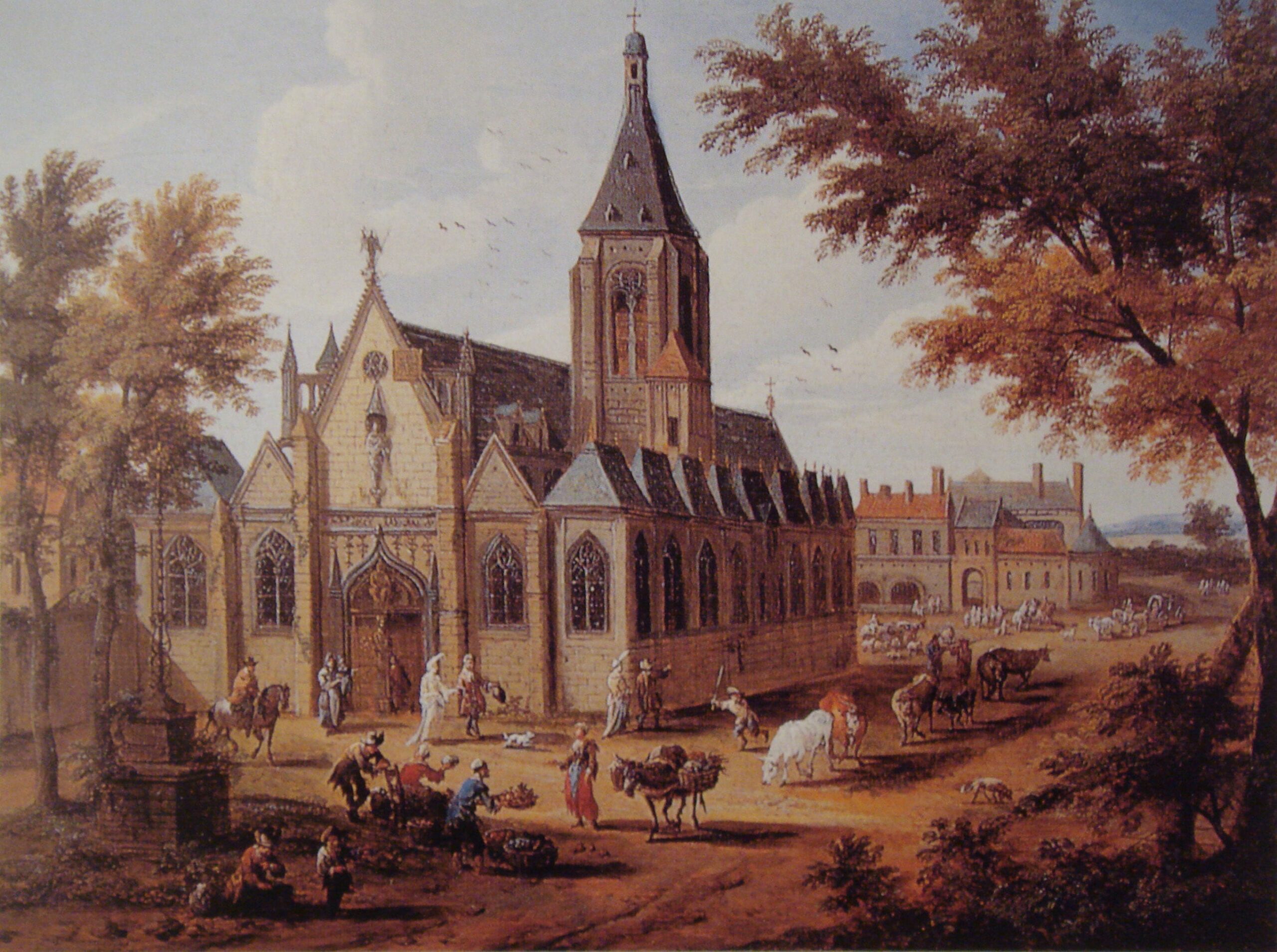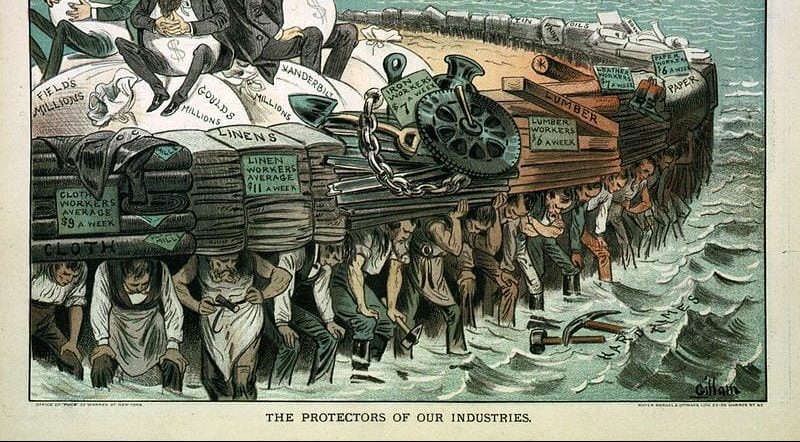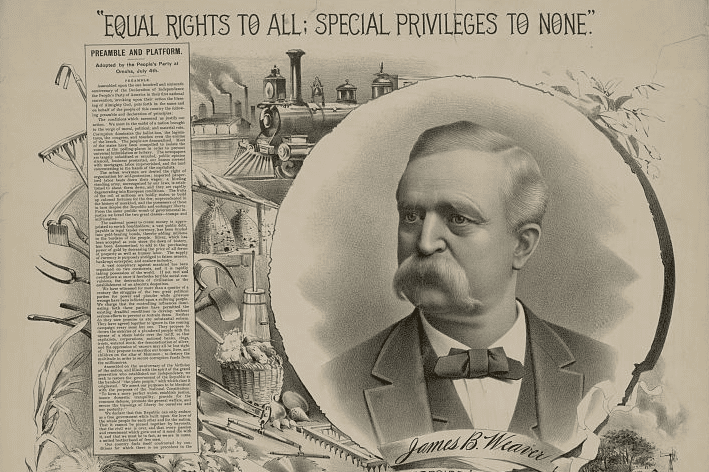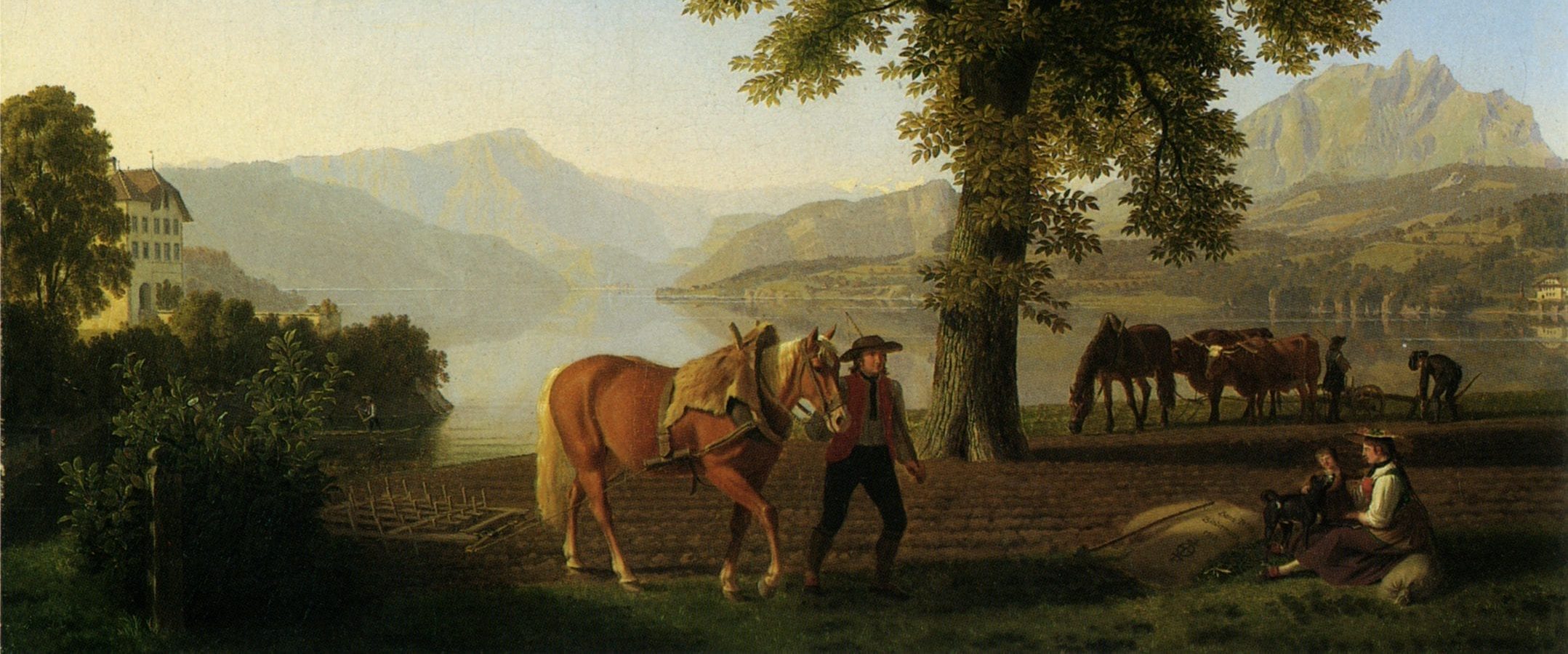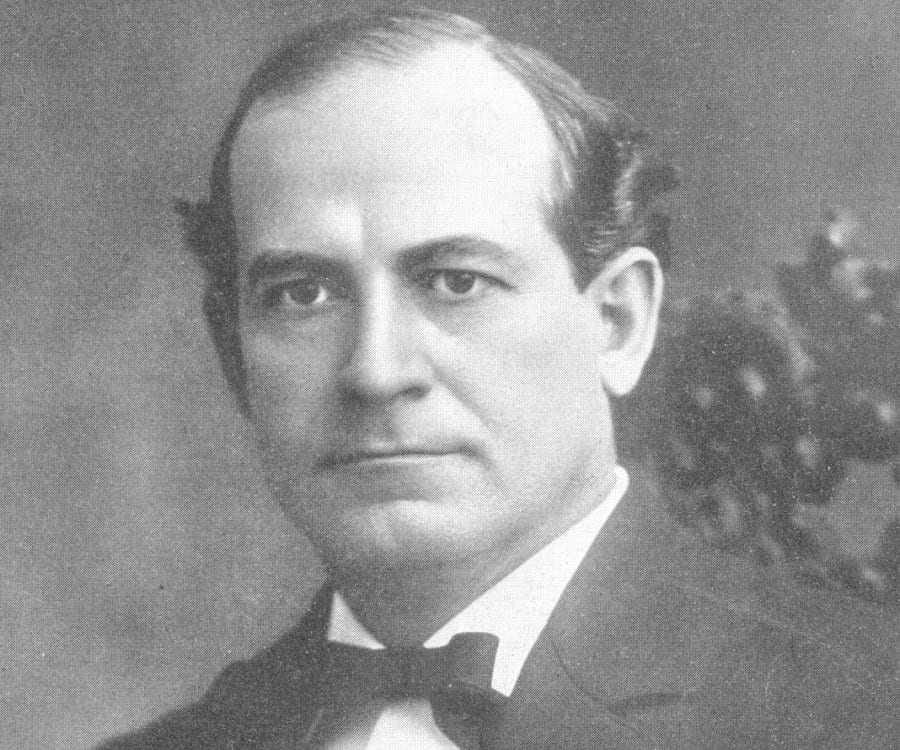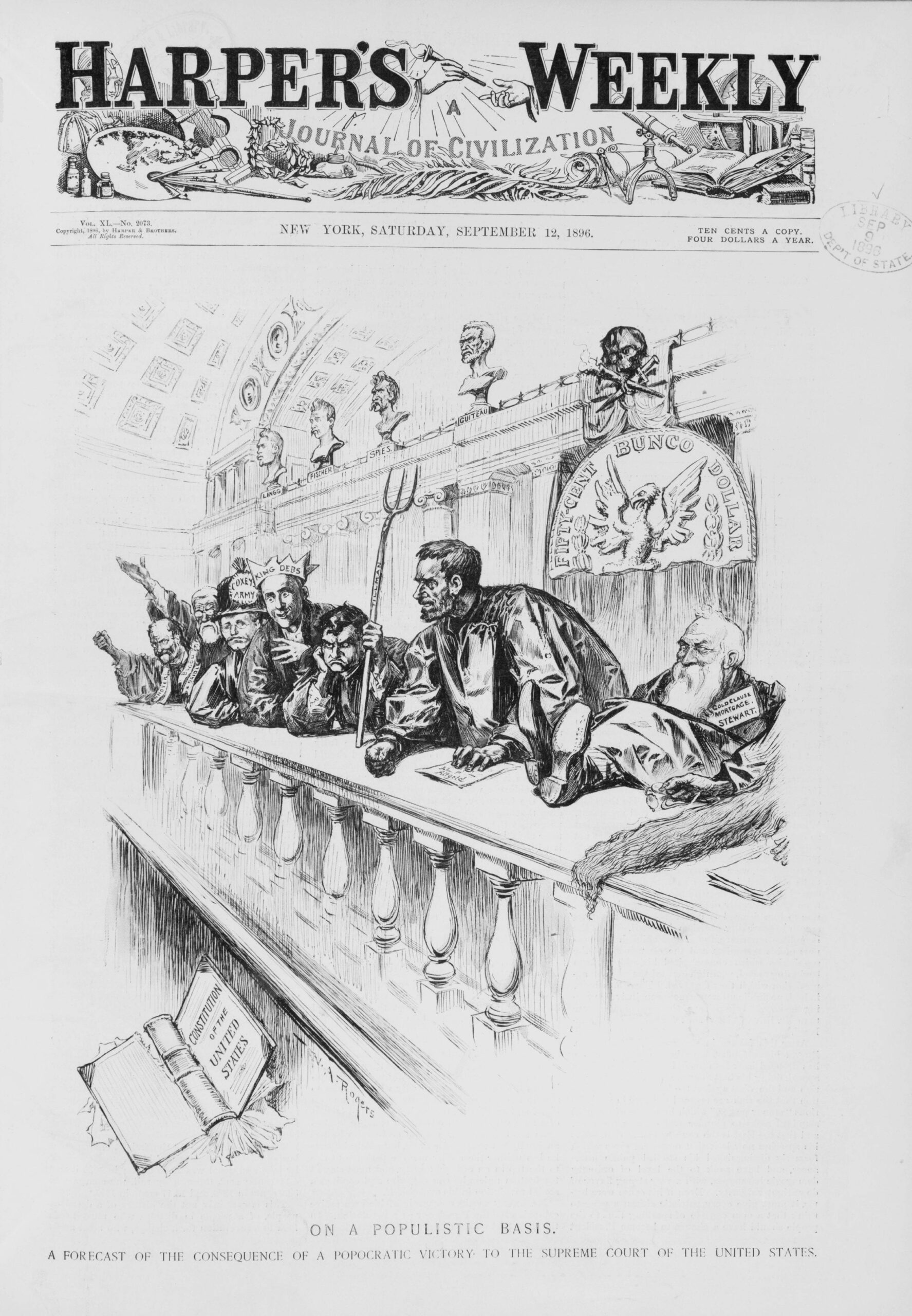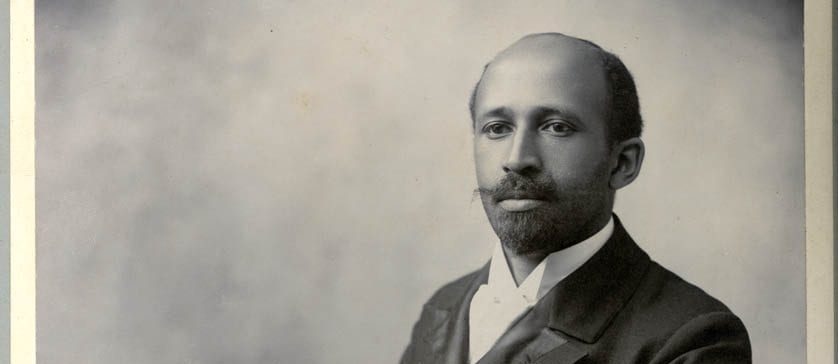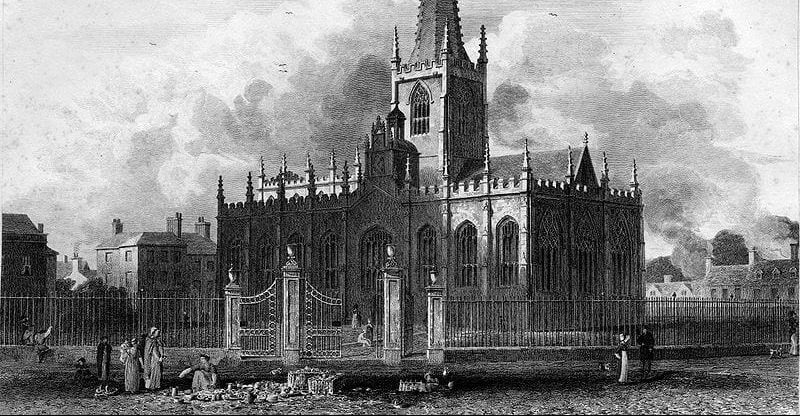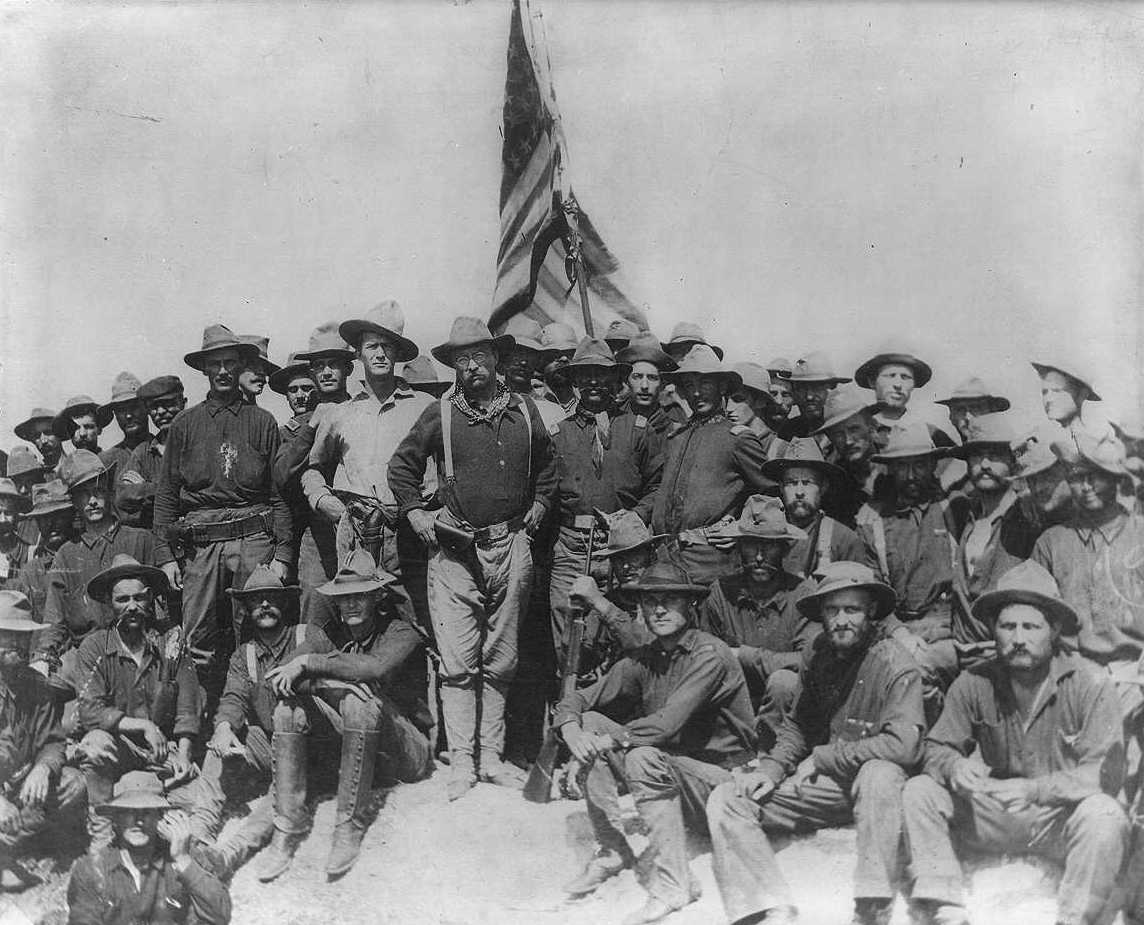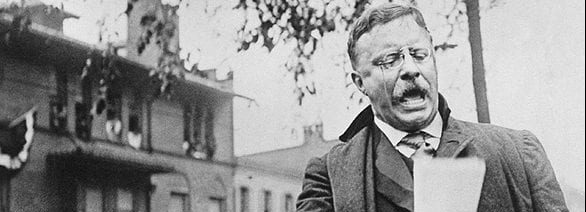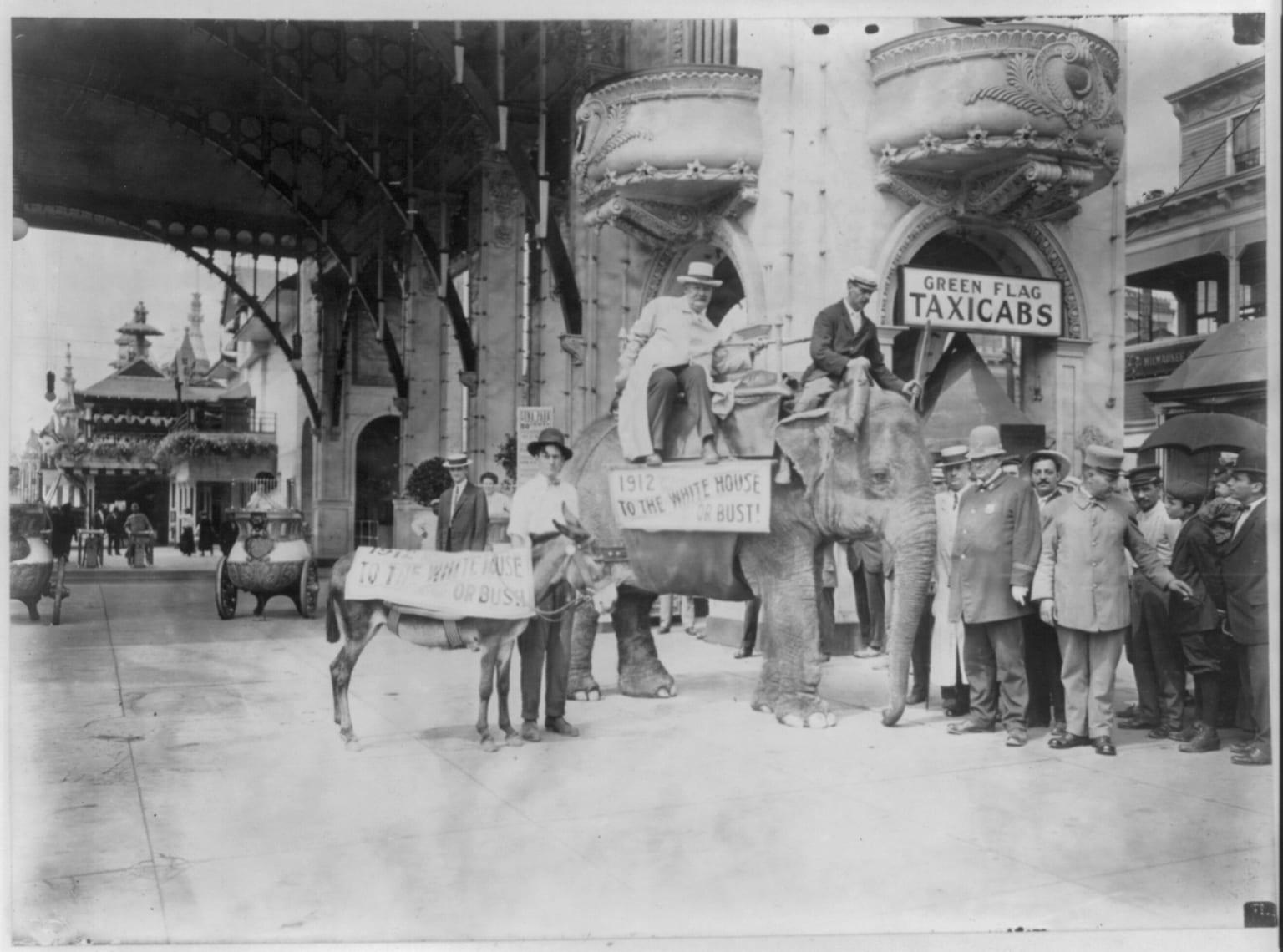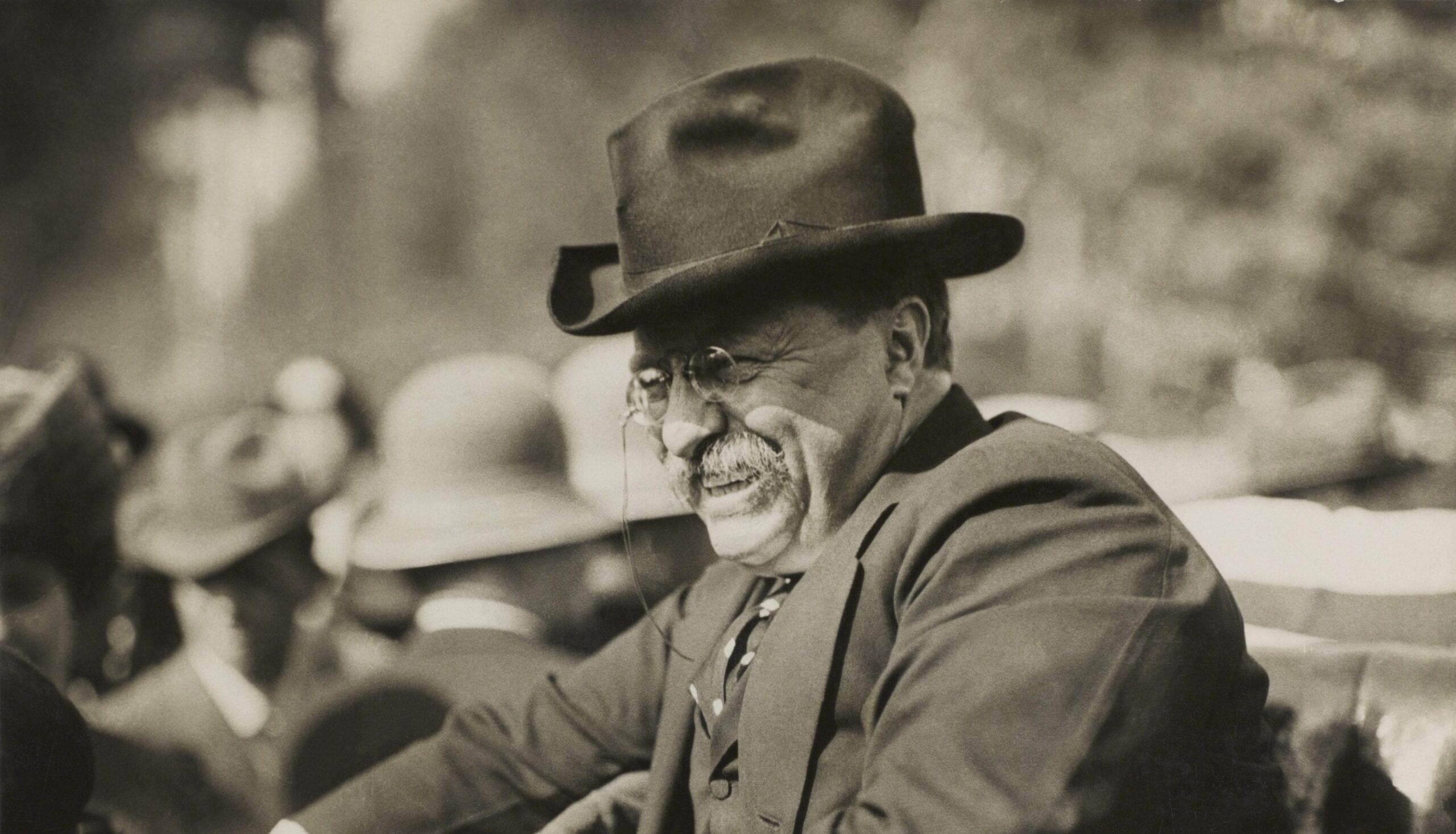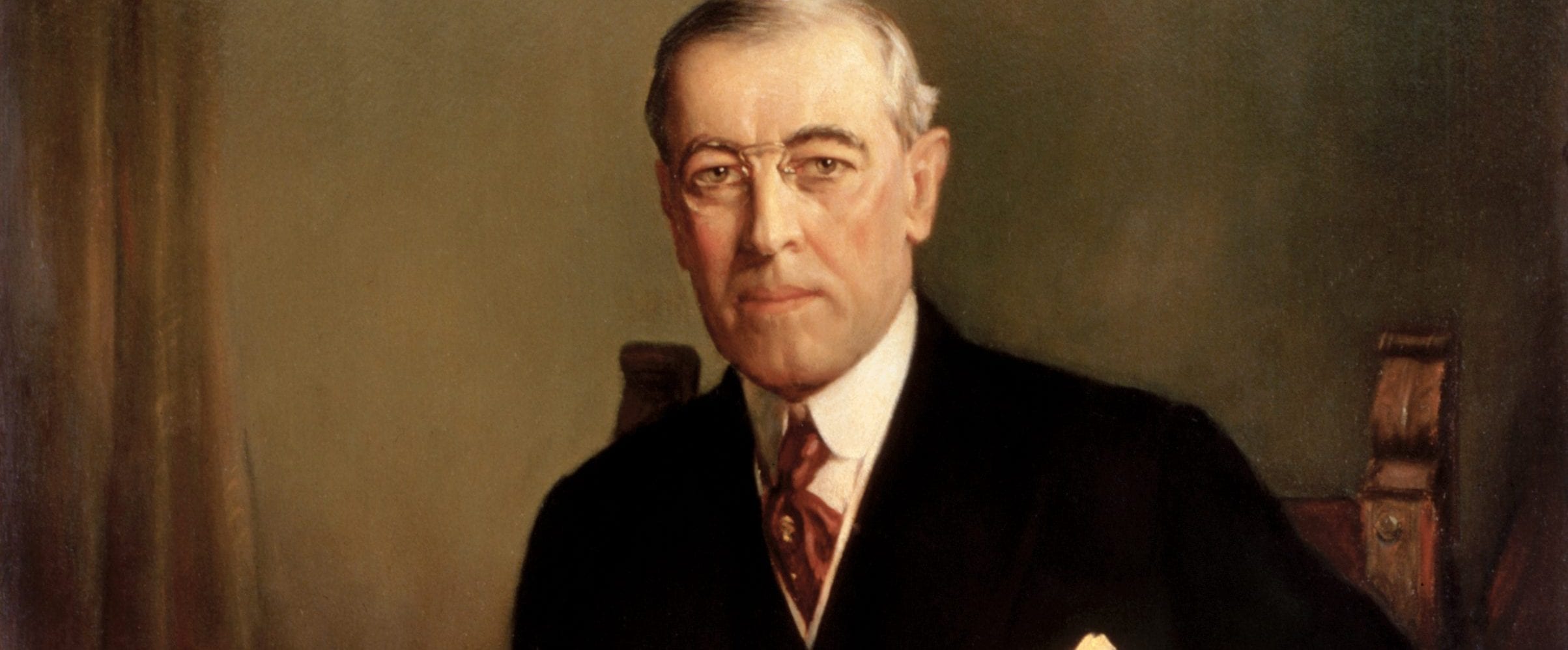
No study questions
No related resources
Introduction
A recession in 1893 led the Pullman Sleeping Car Company to reduce the wages of its workers. When it reduced wages, it did not reduce rents in the company housing it supplied its workers. As a result, the workers went on strike on May 11, 1894. Eugene V. Debs had recently organized the American Railway Union (ARU). Although at first reluctant to get involved, he eventually seized on the Pullman strike as an opportunity to organize Pullman workers and add them to the ARU’s members. The Pullman Company refused to recognize the union. To make the strike effective, Debs organized a boycott of any train that had a Pullman car. Other labor leaders and labor organizations opposed the boycott, but ARU members around the country were able to disrupt interstate rail traffic, including that which carried the US mail. (See Document B for one example of the public perception this created of Debs and his union.)
To get the mail moving, President Grover Cleveland ordered US attorneys and the Army to deal with the strike, which had included acts of violence against trains and other railroad property. (The Governor of Illinois, seeing the strike as a state and local matter, claimed that Cleveland had no constitutional right to do so.) A federal court issued an injunction barring the union from hindering railroad traffic. Debs ignored the injunction. He was arrested on federal contempt and conspiracy charges. The conspiracy charge was dropped, as Debs mentions (Document D), but he was ordered to jail for contempt for ignoring the injunction. His attorneys appealed. The Supreme Court decided unanimously (Document C) in favor of the US government and the power of the Federal courts to issue an injunction against the strike.
The Supreme Court’s decision was a setback for labor, as the courts proved willing in ensuing years to issue the injunctions that the Supreme Court had approved. As Document A argues, however, outside the courts organized labor was finding its place in American life. In a conciliatory move, six days after the Pullman strike ended, Congress passed and Cleveland signed a law that established Labor Day, a national holiday honoring workingmen. In 1932, the Norris-LaGuardia Act gave unions full freedom of association and outlawed the kind of injunctions the Supreme Court had approved to end the Pullman strike. Public opinion toward unions changed in part because of the growing perception of the power of the so-called trusts. On the trusts, see footnote 3 below and illustration on page 136.
Documents in this chapter are available separately by following the hyperlinks below:
A. United States Strike Commission, Report on the Chicago Strike, June-July 1894, December 10, 1894
B. “King Debs,” Harper’s Weekly, July 14, 1894
C. Associate Justice David Brewer, In re Debs, May 7, 1895
Discussion Questions
A. What arguments do the authors of the Strike Commission report use to justify the activities of labor unions? What union activities do they argue are illegitimate? Does the Supreme Court decision in In re Debs take a different view? Where does the court say that workingmen and unions should look for redress of their grievances? Do you think that Debs was right that he was denied his rights?
B. Are there similarities between the struggles of unions, women, and African-Americans to gain recognition and protection of their rights? What role have the courts and legislation played in each case? Why did both Eugene V. Debs and Martin Luther King, Jr. (Chapter 26, Document C) appeal to the Declaration of Independence? What is the connection between the Declaration and the rights claims made by workingmen, women, and African Americans? Could those claims be made without the Declaration?
C. Compare the attitudes about labor presented here with those in Volume 1, Chapter 10. What similarities or differences do they seem to reflect the same set of underlying assumptions about the role of the government in the economic relationships between labor and management?
A. United States Strike Commission, Report on the Chicago Strike, June-July 1894, December 10, 1894
The commission has tried to find the drift of public opinion as to strike, boycotts, and labor disputes upon railroads, and to find their remedy. The invitation freely extended in this direction has brought before the commission many expressions of views, orally and by written communications. A condensation of these latter is presented with this report. In reaching its conclusions the commission has endeavored, after careful consideration, to give due weight to the many suggestions and arguments presented. It is encouraging to find general concurrence, even among labor leaders, in condemning strikes, boycotts, and lockouts as barbarisms unfit for the intelligence of this age, and as economically considered, very injurious and destructive forces. Whether won or lost is broadly immaterial. They are war – internecine war – and call for progress to a higher plane of education and intelligence in adjusting the relations of capital and labor. These barbarisms waste the products of both capital and labor, defy law and order, disturb society, intimidate capital, convert industrial paths where there ought to be plenty into highways of poverty and crime, bear as their fruit the arrogant flush of victory and the humiliating sting of defeat, and lead to preparations for greater and more destructive conflicts. Since nations have grown to the wisdom of avoiding disputes by conciliation, and even of settling them by arbitration, why should capital and labor in their dependence upon each other persist in cutting each other’s throats as a settlement of differences? Official reports show that much progress has been made in the more sane direction of conciliation and arbitration even in America. Abroad they are in advance of us in this policy. Were our population as dense and opportunities as limited as abroad, present industrial conditions would keep us much more disturbed than we now are by contests between capital and labor.
In England, prior to 1824, it was conspiracy and felony for labor to unite for purposes now regarded there by all classes as desirable for the safety of the Government, of capital, and for the protection of the rights of labor. All industrial labor is there, as a rule, covered by unions trained to greater conservatism through many disastrous conflicts under harsh conditions and surroundings. Capital abroad prefers to deal with these unions rather than with individuals or mobs, and from their joint efforts in good faith at conciliation and arbitration much good and many peaceful days have resulted. In fifteen of our States arbitration in various forms is now provided by law; the United States and eleven States have sanctioned labor organizations by statute. Some of our courts, however, are still poring over the law reports of antiquity in order to construe conspiracy out of labor unions. We also have employers who obstruct progress by perverting and misapplying the law of supply and demand, and who, while insisting upon individualism for workmen, demand that they shall be let alone to combine as they please and that society and all its forces shall protect them in their resulting contentions.
The general sentiment of employers, shared in by some of the most prominent railroad representatives we have heard, is now favorable to organization among employees. It results in a clearer presentation and calmer discussion of differences, instills mutual respect and forbearance, brings out the essentials, and eliminates misunderstandings and immaterial matters. To an ordinary observer, argument to sustain the justice and necessity of labor unions and unity of action by laborers is superfluous.
The rapid concentration of power and wealth, under stimulating legislative conditions, in persons, corporations, and monopolies has greatly changed the business and industrial situation. Our railroads were chartered upon the theory that their competition would amply protect shippers as to rates, etc., and employees as to wages and other conditions. Combination has largely destroyed this theory, and has seriously disturbed the natural working of the laws of supply and demand, which, in theory, are based upon competition for labor between those who “demand” it as well as among those who supply it. The interstate commerce act and railroad-commission legislation in over thirty States are simply efforts of the people to free themselves from the results of this destruction of competition by combination. Labor is likewise affected by this progressive combination. While competition among railroad employers of labor is gradually disappearing, competition among those who supply labor goes on with increasing severity. For instance, as we have shown, there is no longer any competitive demand among the 24 railroads at Chicago for switchmen. They have ceased competing with each other; they are no longer 24 separate and competing employers; they are virtually one. To be sure, this combination has not covered the whole field of labor supply as yet, but it is constantly advancing in that direction. Competition for switchmen’s labor still continues with outside employers, among whom, again, we find a like tendency to eliminate competitive demand for labor by similar combination. In view of this progressive perversion of the laws of supply and demand by capital and changed conditions, no man can well deny the right nor dispute the wisdom of unity for legislative and protective purposes among those who supply labor.
However men may differ about the propriety and legality of labor unions, we must all recognize the fact that we have them with us to stay and to grow more numerous and powerful. Is it not wise to fully recognize them by law; to admit their necessity as labor guides and protectors, to conserve their usefulness, increase their responsibility, and to prevent their follies and aggression by conferring upon them the privileges enjoyed by corporations, with like proper restrictions and regulations? The growth of corporate power and wealth has been the marvel of the past fifty years. Corporations have undoubtedly benefited the country and brought its resources to our doors. It will not be surprising if the marvel of the next fifty years be the advancement of labor to a position of like power and responsibility. We have heretofore encouraged the one and comparatively neglected the other. Does not wisdom demand that each be encouraged to prosper legitimately and to grow into harmonious relations of equal standing and responsibility before the law? This involves nothing hostile to the true interests and rights of either. . . .
The commission deems recommendations of specific remedies premature. Such a problem, for instance, as universal Government ownership of railroads is too vast, many-sided, and far away, if at-tempted, to be considered as an immediate, practical remedy. It belongs to the socialistic group of public questions where Government ownership is advocated of monopolies, such as telegraphs, telephones, express companies, and municipal ownership of waterworks, gas and electric lighting, and street railways. These questions are pressing more urgently as time goes on. They need to be well studied and considered in every aspect by all citizens. Should continued combinations and consolidations result in half a dozen or less ownerships of our railroads within a few years, as is by no means unlikely, the question of Government ownership will be forced to the front, and we need to be ready to dispose of it intelligently. As combination goes on there will certainly at least have to be greater Government regulation and control of quasi-public corporations than we have now.
Whenever a nation or a state finds itself in such relation to a railroad that its investments therein must be either lost or protected by ownership, would it not be wise that the road be taken and the experiment be tried as an object lesson in Government ownership? The Massachusetts Railroad Commission, which is noted for its eminent services as a conservative pioneer in the direction of Government control of railroads through the force of public opinion, for several years urged that the experiment of State ownership be tried with the Fitchburg system, because of the large State investment in the Hoosac Tunnel. We need to fear everything revolutionary and wrong, but we need fear nothing that any nation can successfully attempt in directions made necessary by changed economic or industrial conditions. Other nations under their conditions own and operate telegraphs and railroad with varying results. Whether it is practicable for this nation to do so successfully when it becomes necessary to save an investment or when the people determine it shall be done, is an open and serious question which can not be answered fully except by actual experiment. . . .
In solving these questions, corporations seldom aid the efforts of the people or their legislators. Fear of change and the threatened loss of some power invariably make them obstructionists. They do not desire to be dealt with by any legislation; they simply want to be let alone, confident in their ability to protect themselves. Whatever is right to be done by statutes must be done by the people for their own protection and to meet the just demand that railroad labor shall have public and impartial hearing of all grievances.
The commission does not pretend to present a specific solution of these questions. Its effort is simply to present the facts; to point out that the relations of capital and labor are so disturbed as to urgently demand the attention of all thinking and patriotic citizens; to suggest a line of search for practical remedial legislation which may be followed with safety, and, finally, to urge and invite labor and railroads to hearty cooperation with the Government and the people in efforts to substitute law and reason in labor dispute for the dangers, sufferings, uncertainties, and wide-spread calamities incident to strikes, boycotts, and lockouts. . . . can we fix the hanging period?
The commission urges employers to recognize labor organizations; that such organizations be dealt with through representatives, with special reference to conciliation and arbitration when difficulties are threatened or arise. It is satisfied that employers should come in closer touch with labor and should recognize that, while the interests of labor and capital are not identical, they are reciprocal.
The commission is satisfied that if employers everywhere will endeavor to act in concert with labor; that if wages can be raised under economic conditions they can be raised voluntarily, and that if when there are reductions, reasons be given for the reduction, much friction can be avoided. It is also satisfied that if employers will consider employees as thoroughly essential to industrial success as capital, and thus take labor into consultation at proper times, much of the severity of strikes can be tempered and their number reduced.
B. “King Debs,” Harper’s Weekly, July 14, 1894
See illustration on page 136.
C. Associate Justice David Brewer, In re Debs, May 7, 1895
MR. JUSTICE BREWER, after stating the case, delivered the opinion of the court.
The case presented by the bill is this: the United States, finding that the interstate transportation of persons and property, as well as the carriage of the mails, is forcibly obstructed, and that a combination and conspiracy exists to subject the control of such transportation to the will of the conspirators, applied to one of their courts, sitting as a court of equity, for an injunction to restrain such obstruction and prevent carrying into effect such conspiracy. Two questions of importance are presented: First. Are the relations of the general government to interstate commerce and the transportation of the mails such as authorize a direct interference to prevent a forcible obstruction thereof. Second. If authority exists, as authority in governmental affairs implies both power and duty, has a court of equity jurisdiction to issue an injunction in aid of the performance of such duty.
First. What are the relations of the general government to interstate commerce and the transportation of the mails? They are those of direct supervision, control, and management. While, under the dual system which prevails with us, the powers of government are distributed between the State and the Nation, and while the latter is properly styled a government of enumerated powers, yet within the limits of such enumeration, it has all the attributes of sovereignty, and, in the exercise of those enumerated powers, acts directly upon the citizen, and not through the intermediate agency of the State. . . .
[In support of this claim, Justice Brewer here cited judicial precedents as far back as McCulloch v. Maryland, 1819. We have included in this excerpt only a few of his other numerous references to and discussions of judicial precedents and Congressional legislation.]
Among the powers expressly given to the national government are the control of interstate commerce and the creation and management of a post office system for the nation. Article I, section 8, of the Constitution provides that
the Congress shall have power . . . Third, to regulate commerce with foreign nations and among the several States, and with the Indian tribes. . . . Seventh, to establish post offices and post roads.
Congress has exercised the power granted in respect to interstate commerce in a variety of legislative acts. . . .
As, under the Constitution, power over interstate commerce and the transportation of the mails is vested in the national government, and Congress, by virtue of such grant, has assumed actual and direct control, it follows that the national government may prevent any unlawful and forcible interference therewith. But how shall this be accomplished? Doubtless it is within the competency of Congress to prescribe by legislation that any interference with these matters shall be offences against the United States, and prosecuted and punished by indictment in the proper courts. But is that the only remedy? Have the vast interests of the nation in interstate commerce and in the transportation of the mails no other protection than lies in the possible punishment of those who interfere with it? . . .
. . . The entire strength of the nation may be used to enforce in any part of the land the full and free exercise of all national powers and the security of all rights entrusted by the Constitution to its care. The strong arm of the national government may be put forth to brush away all obstructions to the freedom of interstate commerce or the transportation of the mails. If the emergency arises, the army of the Nation, and all its militia, are at the service of the Nation to compel obedience to its laws. . . .
. . . [T]he right to use force does not exclude the right of appeal to the courts for a judicial determination and for the exercise of all their powers of prevention. Indeed, it is more to the praise than to the blame of the government that, instead of determining for itself questions of right and wrong on the part of these petitioners and their associates and enforcing that determination by the club of the policeman and the bayonet of the soldier, it submitted all those questions to the peaceful determination of judicial tribunals, and involved their consideration and judgment as to the measure of its rights and powers and the correlative obligations of those against whom it made complaint. And it is equally to the credit of the latter that the judgment of those tribunals was by the great body of them respected, and the trouble which threatened so much disaster terminated.
Neither can it be doubted that the government has such an interest in the subject matter as enables it to appear as party plaintiff in this suit. It is said that equity only interferes for the protection of property, and that the government has no property interest. A sufficient reply is that the United States have a property in the mails, the protection of which was one of the purposes of this bill. . . .
. . . Every government, entrusted, by the very terms of its being, with powers and duties to be exercised and discharged for the general welfare, has a right to apply to its own courts for any proper assistance in the exercise of the one and the discharge of the other, and it is no sufficient answer to its appeal to one of those courts that it has no pecuniary interest in the matter. The obligations which it is under to promote the interest of all, and to prevent the wrongdoing of one resulting in injury to the general welfare, is often, of itself, sufficient to give it a standing in court. This proposition in some of its relations has heretofore received the sanction of this court. . . .
. . . [W]hile it is not the province of the government to interfere in any mere matter of private controversy between individuals, or to use its great powers to enforce the rights of one against another, yet, whenever the wrongs complained of are such as affect the public at large, and are in respect of matters which by the Constitution are entrusted to the care of the Nation and concerning which the Nation owes the duty to all the citizens of securing to them their common rights, then the mere fact that the government has no pecuniary interest in the controversy is not sufficient to exclude it from the courts or prevent it from taking measures therein to fully discharge those constitutional duties.
The national government, given by the Constitution power to regulate interstate commerce, has, by express statute, assumed jurisdiction over such commerce when carried upon railroads. It is charged, therefore, with the duty of keeping those highways of interstate commerce free from obstruction, for it has always been recognized as one of the powers and duties of a government to remove obstructions from the highways under its control. . . .
Up to a recent date, commerce, both interstate and international, was mainly by water, and it is not strange that both the legislation of Congress and the cases in the courts have been principally concerned therewith. The fact that, in recent years, interstate commerce has come mainly to be carried on by railroads and over artificial highways has in no manner narrowed the scope of the constitutional provision or abridged the power of Congress over such commerce. On the contrary, the same fullness of control exists in the one case as in the other, and the same power to remove obstruction from the one as from the other. Constitutional provisions do not change, but their operation extends to new matters as the modes of business and the habits of life of the people vary with each succeeding generation. . . .The Constitution has not changed. The power is the same. But it operates today upon modes of interstate commerce unknown to the fathers, and it will operate with equal force upon any new modes of such commerce which the future may develop. It is said that seldom have the courts assumed jurisdiction to restrain by injunction in suits brought by the government, either state or national, obstructions to highways, either artificial or natural. This is undoubtedly true, but the reason is that the necessity for such interference has only been occasional. Ordinarily, the local authorities have taken full control over the matter, and by indictment for misdemeanor, or in some kindred way, have secured the removal of the obstruction and the cessation of the nuisance. . . .
That the bill filed in this case alleged special facts calling for the exercise of all the powers of the court is not open to question. The picture drawn in it of the vast interests involved, not merely of the city of Chicago and the State of Illinois, but of all the States, and the general confusion into which the interstate commerce of the country was thrown; the forcible interference with that commerce; the attempted exercise by individuals of powers belonging only to government, and the threatened continuance of such invasions of public right, presented a condition of affairs which called for the fullest exercise of all the powers of the courts. If ever there was a special exigency, one which demanded that the court should do all that courts can do, it was disclosed by this bill, and we need not turn to the public history of the day, which only reaffirms with clearest emphasis all its allegations. . .
Again, it is objected that it is outside of the jurisdiction of a court of equity to enjoin the commission of crimes. This, as a general proposition, is unquestioned. A chancellor has no criminal jurisdiction. Something more than the threatened commission of an offence against the laws of the land is necessary to call into exercise the injunctive powers of the court. There must be some interferences, actual or threatened, with property or rights of a pecuniary nature, but when such interferences appear, the jurisdiction of a court of equity arises, and is not destroyed by the fact that they are accompanied by, or are themselves, violations of the criminal law. . . .
Nor is there in this any invasion of the constitutional right of trial by jury. . . .But the power of a court to make an order carries with it the equal power to punish for a disobedience of that order, and the inquiry as to the question of disobedience has been from time immemorial the special function of the court. And this is no technical rule. In order that a court may compel obedience to its orders, it must have the right to inquire whether there has been any disobedience thereof. To submit the question of disobedience to another tribunal, be it a jury or another court, would operate to deprive the proceeding of half its efficiency. . . .
In brief, a court, enforcing obedience to its orders by proceedings for contempt, is not executing the criminal laws of the land, but only securing to suitors the rights which it has adjudged them entitled to. . . .
. . . It surely cannot be seriously contended that the court has jurisdiction to enjoin the obstruction of a highway by one person, but that its jurisdiction ceases when the obstruction is by a hundred persons. It may be true, as suggested, that, in the excitement of passion, a mob will pay little heed to processes issued from the courts, and it may be, as said by counsel in argument, that it would savor somewhat of the puerile and ridiculous to have read a writ of injunction to Lee’s army during the late civil war. It is doubtless true that inter arma leges silent, and in the throes of rebellion or revolution, the processes of civil courts are of little avail, for the power of the courts rests on the general support of the people and their recognition of the fact that peaceful remedies are the true resort for the correction of wrongs. But does not counsel’s argument imply too much? Is it to be assumed that these defendants were conducting a rebellion or inaugurating a revolution, and that they and their associates were thus placing themselves beyond the reach of the civil process of the courts? We find in the opinion of the Circuit Court a quotation from the testimony given by one of the defendants before the United States Strike Commission, which is sufficient answer to this suggestion:
As soon as the employees found that we were arrested, and taken from the scene of action, they became demoralized, and that ended the strike. It was not the soldiers that ended the strike. It was not the old brotherhoods that ended the strike. It was simply the United States courts that ended the strike. . . . [N]ot by the army, and not by any other power, but simply and solely by the action of the United States courts in restraining us from discharging our duties as officers and representatives of our employees.
Whatever any single individual may have thought or planned, the great body of those who were engaged in these transactions contemplated neither rebellion nor revolution, and when, in the due order of legal proceedings, the question of right and wrong was submitted to the courts, and by them decided, they unhesitatingly yielded to their decisions. The outcome, by the very testimony of the defendants, attests the wisdom of the course pursued by the government, and that it was well not to oppose force simply by force, but to invoke the jurisdiction and judgment of those tribunals to whom, by the Constitution and in accordance with the settled conviction of all citizens, is committed the determination of questions of right and wrong between individuals, masses, and States.
It must be borne in mind that this bill was not simply to enjoin a mob and mob violence. It was not a bill to command a keeping of the peace; much less was its purport to restrain the defendants from abandoning whatever employment they were engaged in. The right of any laborer, or any number of laborers, to quit work was not challenged. The scope and purpose of the bill was only to restrain forcible obstructions of the highways along which interstate commerce travels and the mails are carried. And the facts set forth at length are only those facts which tended to show that the defendants were engaged in such obstructions.
A most earnest and eloquent appeal was made to us in eulogy of the heroic spirit of those who threw up their employment, and gave up their means of earning a livelihood, not in defense of their own rights, but in sympathy [with] and to assist others whom they believed to be wronged. We yield to none in our admiration of any act of heroism or self-sacrifice, but we may be permitted to add that it is a lesson which cannot be learnt too soon or too thoroughly that, under this government of and by the people, the means of redress of all wrongs are through the courts and at the ballot box, and that no wrong, real or fancied, carries with it legal warrant to invite as a means of redress the cooperation of a mob, with its accompanying acts of violence.
We have given to this case the most careful and anxious attention, for we realize that it touches closely questions of supreme importance to the people of this country. Summing up our conclusions, we hold that the government of the United States is one having jurisdiction over every foot of soil within its territory, and acting directly upon each citizen; that, while it is a government of enumerated powers, it has within the limits of those powers all the attributes of sovereignty; that to it is committed power over interstate commerce and the transmission of the mail; that the powers thus conferred upon the national government are not dormant, but have been assumed and put into practical exercise by the legislation of Congress; that, in the exercise of those powers, it is competent for the nation to remove all obstructions upon highways, natural or artificial, to the passage of interstate commerce or the carrying of the mail; that while it may be competent for the government (through the executive branch and in the use of the entire executive power of the nation) to forcibly remove all such obstructions, it is equally within its competency to appeal to the civil courts for an inquiry and determination as to the existence and character of any alleged obstructions, and, if such are found to exist, or threaten to occur, to invoke the powers of those courts to remove or restrain such obstructions; that the jurisdiction of courts to interfere in such matter by injunction is one recognized from ancient times and by indubitable authority; that such jurisdiction is not ousted by the fact that the obstructions are accompanied by or consist of acts in themselves violations of the criminal law; that the proceeding by injunction is of a civil character, and may be enforced by proceedings in contempt; that such proceedings are not in execution of the criminal laws of the land; that the penalty for a violation of injunction is no substitute for, and no defense to, a prosecution for any criminal offences committed in the course of such violation; that the complaint filed in this case clearly showed an existing obstruction of artificial highways for the passage of interstate commerce and the transmission of the mail – an obstruction not only temporarily existing, but threatening to continue; that, under such complaint, the Circuit Court had power to issue its process of injunction; that, it having been issued and served on these defendants, the Circuit Court had authority to inquire whether its orders had been disobeyed, and, when it found that they had been, then to proceed under section 725, Revised Statutes . . . [to] enter the order of punishment complained of; and, finally, that, the Circuit Court having full jurisdiction in the premises, its finding of the fact of disobedience is not open to review on habeas corpus in this or any other court. . . .
We enter into no examination of the act of July 2, 1890, c. 647, 26 Stat. 209, upon which the Circuit Court relied mainly to sustain its jurisdiction. It must not be understood from this that we dissent from the conclusions of that court in reference to the scope of the act, but simply that we prefer to rest our judgment on the broader ground which has been discussed in this opinion, believing it of importance that the principles underlying it should be fully stated and affirmed.
The petition for a writ of habeas corpus is
Denied.
D. Eugene V. Debs, Liberty: Speech at Battery D, Chicago, On Release from Woodstock Jail, November 22, 1895
Manifestly the spirit of ‘76 still survives. The fires of liberty and noble aspirations are not yet extinguished. I greet you tonight as lovers of liberty and as despisers of despotism. I comprehend the significance of this demonstration and appreciate the honor that makes it possible for me to be your guest on such an occasion. The vindication and glorification of American principles of government, as proclaimed to the world in the Declaration of Independence, is the high purpose of this convocation.
Speaking for myself personally, I am not certain whether this is an occasion for rejoicing or lamentation. I confess to a serious doubt as to whether this day marks my deliverance from bondage to freedom or my doom from freedom to bondage. Certain it is, in the light of recent judicial proceedings, that I stand in your presence stripped of my constitutional rights as a freeman and shorn of the most sacred prerogatives of American citizenship, and what is true of myself is true of every other citizen who has the temerity to protest against corporation rule or question the absolute sway of the money power. It is not law nor the administration of law of which I complain. It is the flagrant violation of the Constitution, the total abrogation of law and the usurpation of judicial and despotic power, by virtue of which my colleagues and myself were committed to jail, against which I enter my solemn protest; and any honest analysis of the proceedings must sustain the haggard truth of the indictment.
In a letter recently written by the venerable Judge Trumbull that eminent jurist says: “The doctrine announced by the Supreme Court in the Debs case, carried to its logical conclusion, places every citizen at the mercy of any prejudiced or malicious federal judge who may think proper to imprison him.”
. . .
At this juncture I deem it proper to voice my demands for a trial by a jury of my peers. At the instigation of the railroad corporations centering here in Chicago, I was indicted for conspiracy and I insist[ed] upon being tried as to my innocence or guilt. It will be remembered that the trial last winter terminated very abruptly on account of a sick juror. It was currently reported at the time that this was merely a pretext to abandon the trial and thus defeat the vindication of a favorable verdict, which seemed inevitable, and which would have been in painfully embarrassing contrast with the sentence previously pronounced by Judge [William A.] Woods in substantially the same case.
Whether this be true or not, I do not know. I do know, however, that I have been denied a trial, and here and now I demand a hearing of my case. I am charged with conspiracy to commit a crime, and if guilty I should go to the penitentiary. All I ask is a fair trial and no favor. If the counsel for the government, alias the railroads, have been correctly quoted in the press, the case against me is “not to be pressed,” as they “do not wish to appear in the light of persecuting the defendants.” I repel with scorn their professed mercy. Simple justice is the demand. I am not disposed to shrink from the fullest responsibility for my acts. I have had time for meditation and reflection and I have no hesitancy in declaring that under the same circumstances I would pursue precisely the same policy. So far as my acts are concerned, I have neither apology nor regrets. . . .
The theme tonight is personal liberty; or giving it its full height, depth and breadth – American liberty, something that Americans have been accustomed to eulogize since the foundation of the Republic, and multiplied thousands of them continue in the habit to this day because they do not recognize the truth that in the imprisonment of one man in defiance of all constitutional guarantees, the liberties of all are invaded and placed in peril. In saying this, I conjecture I have struck the keynote of alarm that has convoked this vast audience.
For the first time in the records of all the ages, the inalienable rights of man, “life, liberty and the pursuit of happiness,” were proclaimed July 4, 1776.
Strike the fetters from the slave, give him liberty and he becomes an inhabitant of a new world. He looks abroad and beholds life and joy in all things around him. His soul expands beyond all boundaries. Emancipated by the genius of Liberty, he aspires to communion with all that is noble and beautiful, feels himself allied to all the higher order of intelligences, and walks abroad, redeemed from animalism, ignorance and super-stition, a new being throbbing with glorious life. . . .
. . . As Americans, we have boasted of our liberties and continue to boast of them. They were once the nation’s glory, and, if some have vanished, it may be well to remember that a remnant still remains. Out of prison, beyond the limits of Russian injunctions, out of reach of a deputy marshal’s club, above the throttling clutch of corporations and the enslaving power of plutocracy, out of range of the government’s machine guns and knowing the location of judicial traps and deadfalls, Americans may still indulge in the exaltation of liberty, though pursued through every lane and avenue of life by the baying hounds of usurped and unconstitutional power, glad if when night lets down her sable curtains, they are out of prison, though still the wage-slaves of a plutocracy which, were it in the celestial city, would wreck every avenue leading up to the throne of the Infinite by stealing the gold with which they are paved, and debauch Heaven’s supreme court to obtain a decision that the command “thou shalt not steal” is unconstitutional. . . .
. . . Above all, what is the duty of American workingmen whose liberties have been placed in peril? They are not hereditary bondsmen. Their fathers were free born – their sovereignty none denied and their children yet have the ballot. It has been called “a weapon that executes a free man’s will as lighting does the will of God.” It is a metaphor pregnant with life and truth. There is nothing in our government it cannot remove or amend. It can make and unmake presidents and congresses and courts. It can abolish unjust laws and consign to eternal odium and oblivion unjust judges, strip from them their robes and gowns and send them forth unclean as lepers to bear the burden of merited obloquy as Cain with the mark of a murderer. It can sweep away trusts, syndicates, corporations, monopolies, and every other abnormal development of the money power designed to abridge the liberties of workingmen and enslave them by the degradation incident to poverty and enforced idleness, as cyclones scatter the leaves of the forest. The ballot can do all this and more. It can give our civilization its crowning glory – the cooperative commonwealth. . . .
In the great Pullman Strike, the American Railway Union challenged the power of corporations in a way that had not previously been done, and the analyzation of this fact serves to expand it to proportions that the most conservative men of the nation regard with alarm. It must be borne in mind that the American Railway Union did not challenge the government. It threw down no gauntlet to courts or armies – it simply resisted the invasion of the rights of workingmen by corporations. It challenged and defied the power of corporations. Thrice armed with a just cause, the organization believed that justice would win for labor a notable victory, and the records proclaim that its confidence was not misplaced.
The corporations, left to their own resources of money, mendacity and malice, of thugs and ex-convicts, leeches and lawyers, would have been overwhelmed with defeat and the banners of organized labor would have floated triumphant in the breeze.
This the corporations saw and believed – hence the crowning act of infamy in which the federal courts and the federal armies participated, and which culminated in the defeat of labor. . . .
. . . [T]he defeat of the American Railway Union involved questions of law, Constitution and government which, all things considered, are without a parallel in court and governmental proceedings under the Constitution of the Republic. And it is this judicial and administrative usurpation of power to override the rights of states and strike down the liberties of the people that has conferred upon the incidents connected with the Pullman strike such commanding importance as to attract the attention of men of the highest attainments in constitutional law and of statesmen who, like Jefferson, view with alarm the processes by which the Republic is being wrecked and a despotism reared upon its ruins. . . .
From such reflections I turn to the practical lessons taught by this “Liberation Day” demonstration. It means that American lovers of liberty are setting in operation forces to rescue their constitutional liberties from the grasp of monopoly and its mercenary hirelings. It means that the people are aroused in view of impending perils and that agitation, organization, and unification are to be the future battle cries of men who will not part with their birthrights and, like Patrick Henry, will have the courage to exclaim: “Give me liberty or give me death!” I have borne with such composure as I could command the imprisonment which deprived me of my liberty. Were I a criminal; were I guilty of crimes meriting a prison cell; had I ever lifted my hand against the life or the liberty of my fellowmen; had I ever sought to filch their good name, I would not be here. I would have fled from the haunts of civilization and taken up my residence in some cave where the voice of my kindred is never heard. But I am standing here without a self-accusation of crime or criminal intent festering in my conscience, in the sunlight once more, among my fellowmen, contributing as best I can to make this “Liberation Day” from Woodstock prison a memorial day, realizing that, as Lowell sang:
He’s true to God who’s true to man; wherever wrong is done,
To the humblest and the weakest, ‘neath the all-beholding sun.
That wrong is also done to us, and they are slaves most base,
Whose love of right is for themselves and not for all their race.
My Story
December 31, 1917
Conversation-based seminars for collegial PD, one-day and multi-day seminars, graduate credit seminars (MA degree), online and in-person.



